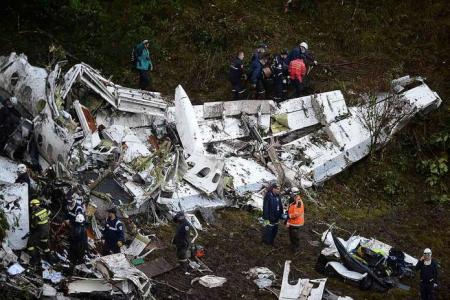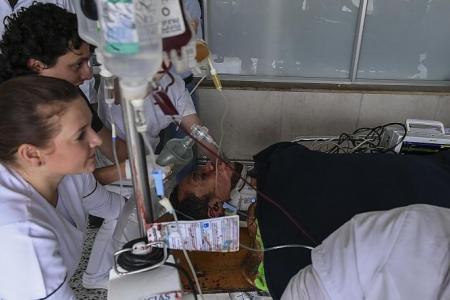Nightmare for fairy-tale team Chapecoense
Brazil in mourning as plane carrying football team Chapecoense, on their way to a major final, crashes
What was supposed to be the biggest game in their history turned into the biggest tragedy when a chartered plane carrying Brazilian football team Chapecoense crashed in the Colombian mountains yesterday morning (Singapore time), with the death toll hitting 76 at press time.
Dozens of bodies were laid out and covered with sheets around the wreckage of the BAe 146 aircraft, which was lying in mud near La Union, a small town outside Medellin.
The plane went down about 10.15pm on Monday night with 72 passengers and a crew of nine.
It was unclear what caused the crash, although local media said the plane had reported an electrical fault shortly before it disappeared off radar screens.
SPLIT IN TWO
A Reuters photographer said the plane split in two, destroying the tail end.
Rain hampered the dozens of rescuers as they combed the muddy and forested area.
Chapecoense, from Brazil's top league, were on their way to face Atletico Nacional of Medellin tomorrow morning (Singapore time) in the first leg of the Copa Sudamericana final - South America's equivalent of the Europa League.
Yesterday, Atletico Nacional offered the championship to Chapecoense.
It was the first time the small club from the southern city of Chapeco had reached the final of a major South American club competition.
The vice-president of the Brazilian club lamented that the tragedy had struck at the cruellest moment.
"The pain is terrible. Just as we had made it, I will not say to the top, but to national prominence, a tragedy like this happens. It is very difficult, a very great tragedy," club vice-president Ivan Tozzo told SportTV.
Colombia's civil aviation head Alfredo Bocanegra said that there were 76 confirmed fatalities, with five injured survivors. He said the death toll could rise.
Tributes poured in from the global football fraternity as Brazil declared three days of mourning.
"I express my solidarity in this sad hour during which tragedy has beset dozens of Brazilian families," President Michel Temer said.
"The government will do all it can to alleviate the pain of the friends and family of sport and national journalism."
Brazilian news organisations said 21 journalists had been on board to cover the match.
Colombia's disaster management agency listed players such as Alan Ruschel and Jakson Follmann as survivors.
Goalkeeper Danilo Padilha "died while being transferred" to hospital, a source in the civil aviation authority told AFP.
Flight tracking service Flightradar24 said on Twitter the last tracking signal from the flight had been received when it was at around 4,700m, about 30km from its destination, which sits at an altitude of 2,100m.
The BAe 146 was produced by a company that is now part of the UK's BAE Systems.
FOOTBALL DISASTERS
The crash evoked memories of other football air disasters, including the Munich crash in 1958 that killed 23 people, including eight Manchester United players, journalists and travelling officials.
Chapecoense qualified for the biggest game in their history after overcoming Argentine club San Lorenzo in the semi-finals on away goals following a 1-1 draw in Buenos Aires and a 0-0 draw at home.
They were underdogs for the match against a club going for a rare Double after winning the Copa Libertadores in July.
Chapecoense are the 21st biggest club in Brazil in terms of revenue, bringing in 46 million reais ($19.2m) last year, according to a list by Brazilian bank Itau BBA.
The club have built their success on a frugal spending policy that eschewed big-money signings and concentrated on blending young talent and experienced journeymen.
Only a few years ago, Chapecoense were just another a gritty outfit in the Brazilian lower leagues, where players, unable to afford cars, took the bus to training.
The stadium in Chapeco, a city of 200,000 people in the southern Santa Catarina state, didn't have a gym.
The steep climb from minnows to contenders started in 2009 when Chapecoense entered the fourth division.
"A lot has changed in the club since I arrived," said the team's top scorer Bruno Rangel.
"There are still prejudices against the club but more because we're from the (country's) interior. That's diminishing, it's true. Every day, we're more respected."
By 2014, the club had fought their way into the lower half of the elite table, but the side wanted more.
Even at this point, Chapecoense were almost ignored by their own public, with only about 7,000 people turning up for home games, according to Globoesporte website.
Chapecoense entered the running for the Copa Sudamericana for the first time in 2015 and didn't disappoint.
In the club's first-ever international tournament, the one-time unknowns didn't go all the way, but they performed bravely, even defeating Argentina's famed River Plate.
This year, things seemed to be going wrong.
The coach credited with Chapecoense's miraculous rise, Guto Ferreira, walked out and his replacement Caio Junior lost his first game against the lowly Cuiaba.
But the little team roared back, taking down Argentina's Independiente and Junior de Barranquilla.
No one was writing them off for the Copa Sudamericana final against Atletico Nacional.
Now their dreams have met a devastating end and there'll be only silence tomorrow morning when it could have been an intriguing first leg of the Copa Sudamericana final.
Back in Chapeco, the stadium was opened up to greet grieving families and fans.
"We're all here at the stadium to help the people connected," said Tozzo.
"It hasn't really sunk in yet.
"We have to trust in God. Our team must carry on," he said. - Wire Services.
This is a very, very sad day for football. At this difficult time, our thoughts are with the victims, their families and friends. Fifa would like to extend its most heartfelt condolences to the fans of Chapecoense, the football community and media organisations concerned in Brazil.
— Fifa president Gianni Infantino
Pray for my teammates please.
— Chapecoense striker Alejandro Martinuccio, who missed the trip due to injury
My deepest condolences to all the families, friends and fans of #Chapecoense.
— Argentina and Barcelona striker Lionel Messi
My prayers and my solidarity for the survivors, families and friends of Chapecoense in this sad time.
— Colombian striker Radamel Falcao
We are deeply shaken by the accident concerning the club of our old player Cleber Santana. Our condolences to the families. Rest in Peace.
— Atletico Madrid, whose former player Cleber Santana was club captain at Chapecoense
#ForcaChapecoense — The thoughts of everyone at Manchester United are with @ChapecoenseReal and all those affected by the tragedy in Colombia.
— Statement from Manchester United, who lost eight players in Feb 1958 as their plane crashed on take-off from Munich airport
Other air disasters
The crash in Colombia of a plane carrying the Brazilian football club Chapecoense, killing 76 people, was among the deadliest air disasters in the sport's history. Here are some others.
May 4, 1949
Eighteen players from Torino were killed along with 13 other people when their plane crashed near Turin, in the first such tragedy to strike the world of football.
Torino provided the bulk of the all-conquering Italy national team and were considered the best club side in the world at the time.
Feb 6, 1958
A plane crash at Munich Airport killed 23 people, including eight Manchester United players, their coach and two team directors.
April 3, 1961
An aircraft transporting part of Chile's Club de Deportes Green Cross crashed in the Andes, killing 24 people, among them eight players and two members of the coaching staff.
Dec 8, 1987
Forty-three people , including 16 players and coach, died when a plane carrying Alianza Lima went down in the Pacific Ocean.
April 27, 1993
A military aircraft carrying most of the national team of Zambia to a World Cup qualifier in Senegal went down in the Atlantic, claiming 30 lives, including 18 players. - AFP.
Get The New Paper on your phone with the free TNP app. Download from the Apple App Store or Google Play Store now




